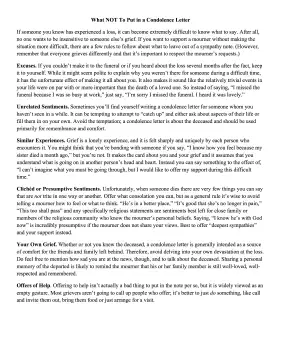

Composing condolence letters can be difficult, but this article instructs writers what to leave out.
If someone you know has experienced a loss, it can become extremely difficult to know what to say. After all, no one wants to be insensitive to someone else's grief. If you want to support a mourner without making the situation more difficult, there are a few rules to follow about what to leave out of a sympathy note. (However, remember that everyone grieves differently and that it's important to respect the mourner's requests.)
Excuses. If you couldn't make it to the funeral or if you heard about the loss several months after the fact, keep it to yourself. While it might seem polite to explain why you weren't there for someone during a difficult time, it has the unfortunate effect of making it all about you. It also makes it sound like the relatively trivial events in your life were on par with or more important than the death of a loved one. So instead of saying, "I missed the funeral because I was so busy at work," just say, "I'm sorry I missed the funeral. I heard it was lovely."
Unrelated Sentiments. Sometimes you'll find yourself writing a condolence letter for someone whom you haven't seen in a while. It can be tempting to attempt to "catch up" and either ask about aspects of their life or fill them in on your own. Avoid the temptation; a condolence letter is about the deceased and should be used primarily for remembrance and comfort.
Similar Experiences. Grief is a lonely experience, and it is felt sharply and uniquely by each person who encounters it. You might think that you're bonding with someone if you say, "I know how you feel because my sister died a month ago," but you're not. It makes the card about you and your grief and it assumes that you understand what is going on in another person's head and heart. Instead you can say something to the effect of, "I can't imagine what you must be going through, but I would like to offer my support during this difficult time."
Clichéd or Presumptive Sentiments. Unfortunately, when someone dies there are very few things you can say that are not trite in one way or another. Offer what consolation you can, but as a general rule it's wise to avoid telling a mourner how to feel or what to think. "He's in a better place," "It's good that she's no longer in pain," "This too shall pass" and any specifically religious statements are sentiments best left for close family or members of the religious community who know the mourner's personal beliefs. Saying, "I know he's with God now" is incredibly presumptive if the mourner does not share your views. Best to offer "deepest sympathies" and your support instead.
Your Own Grief. Whether or not you knew the deceased, a condolence letter is generally intended as a source of comfort for the friends and family left behind. Therefore, avoid delving into your own devastation at the loss. Do feel free to mention how sad you are at the news, though, and to talk about the deceased. Sharing a personal memory of the departed is likely to remind the mourner that his or her family member is still well-loved, well-respected and remembered.
Offers of Help. Offering to help isn't actually a bad thing to put in the note per se, but it is widely viewed as an empty gesture. Most grievers aren't going to call up people who offer; it's better to just do something, like call and invite them out, bring them food or just arrange for a visit.